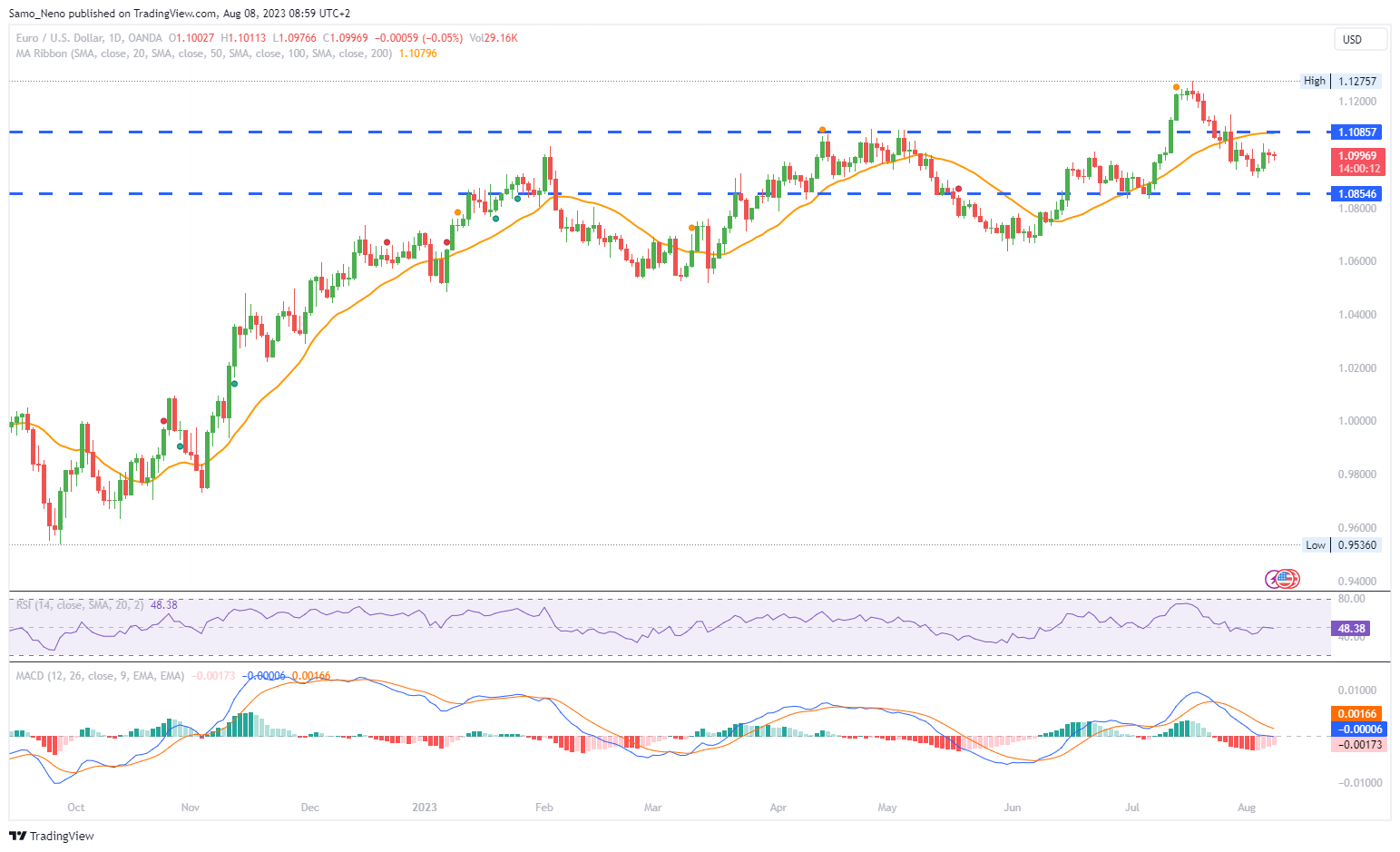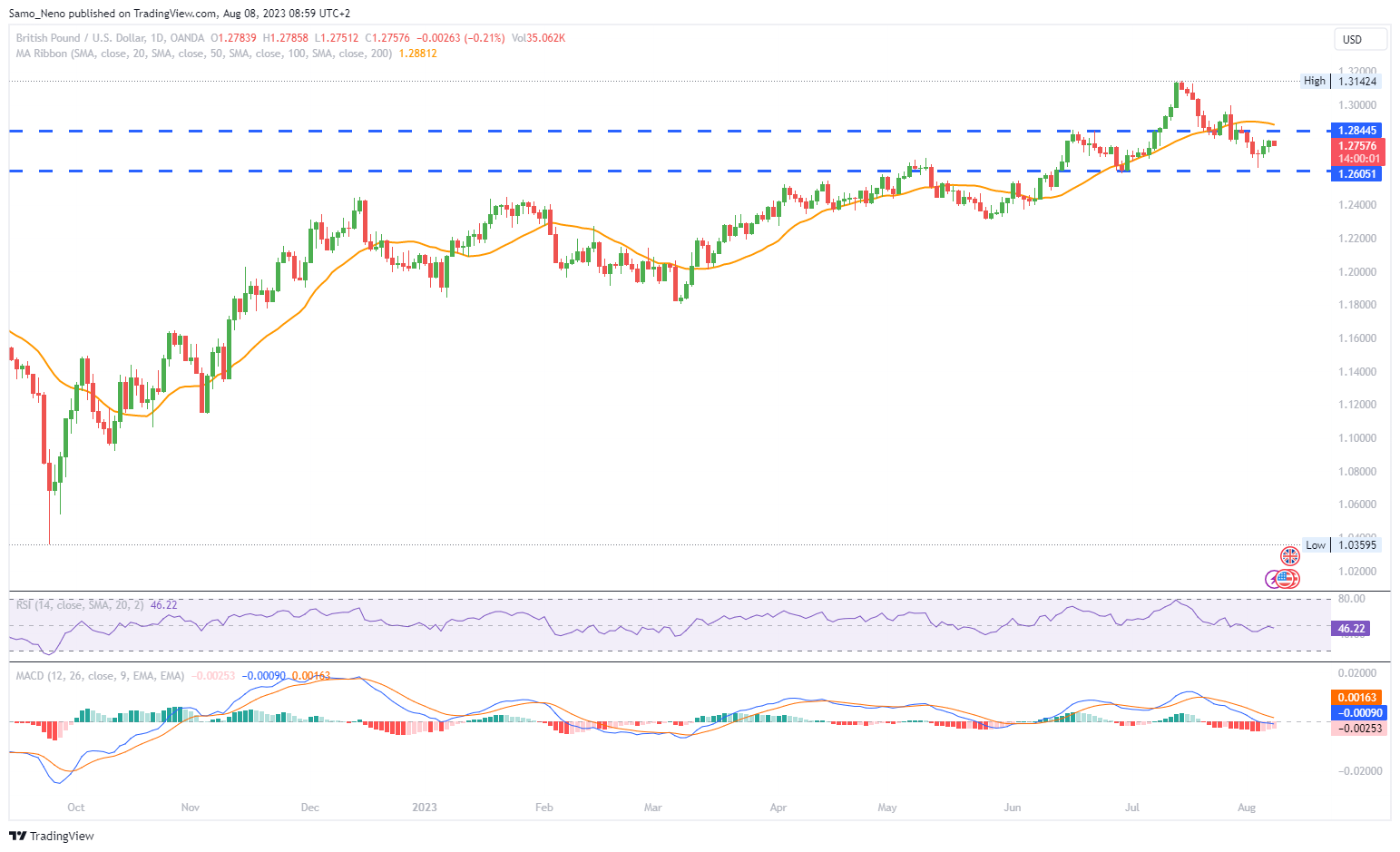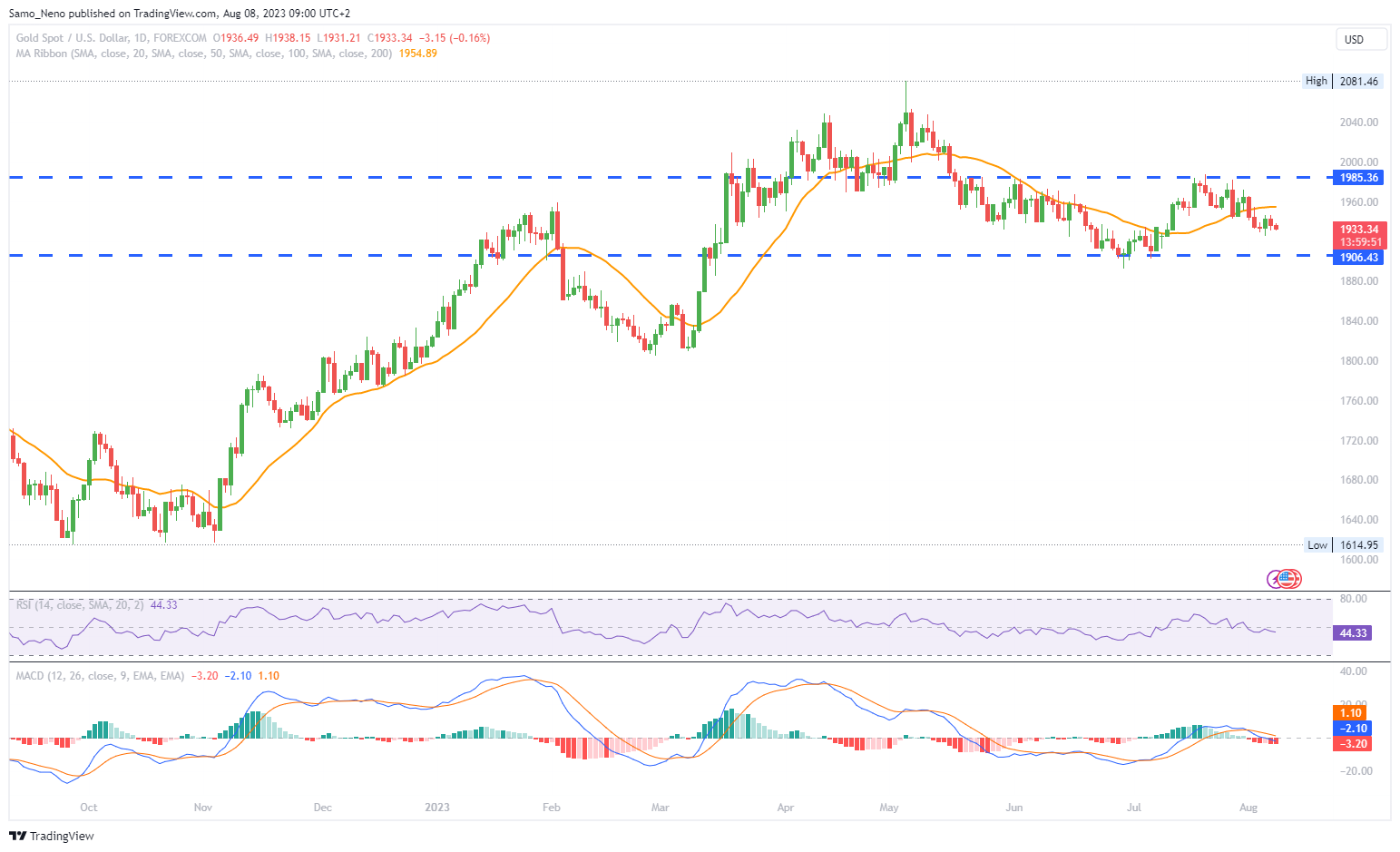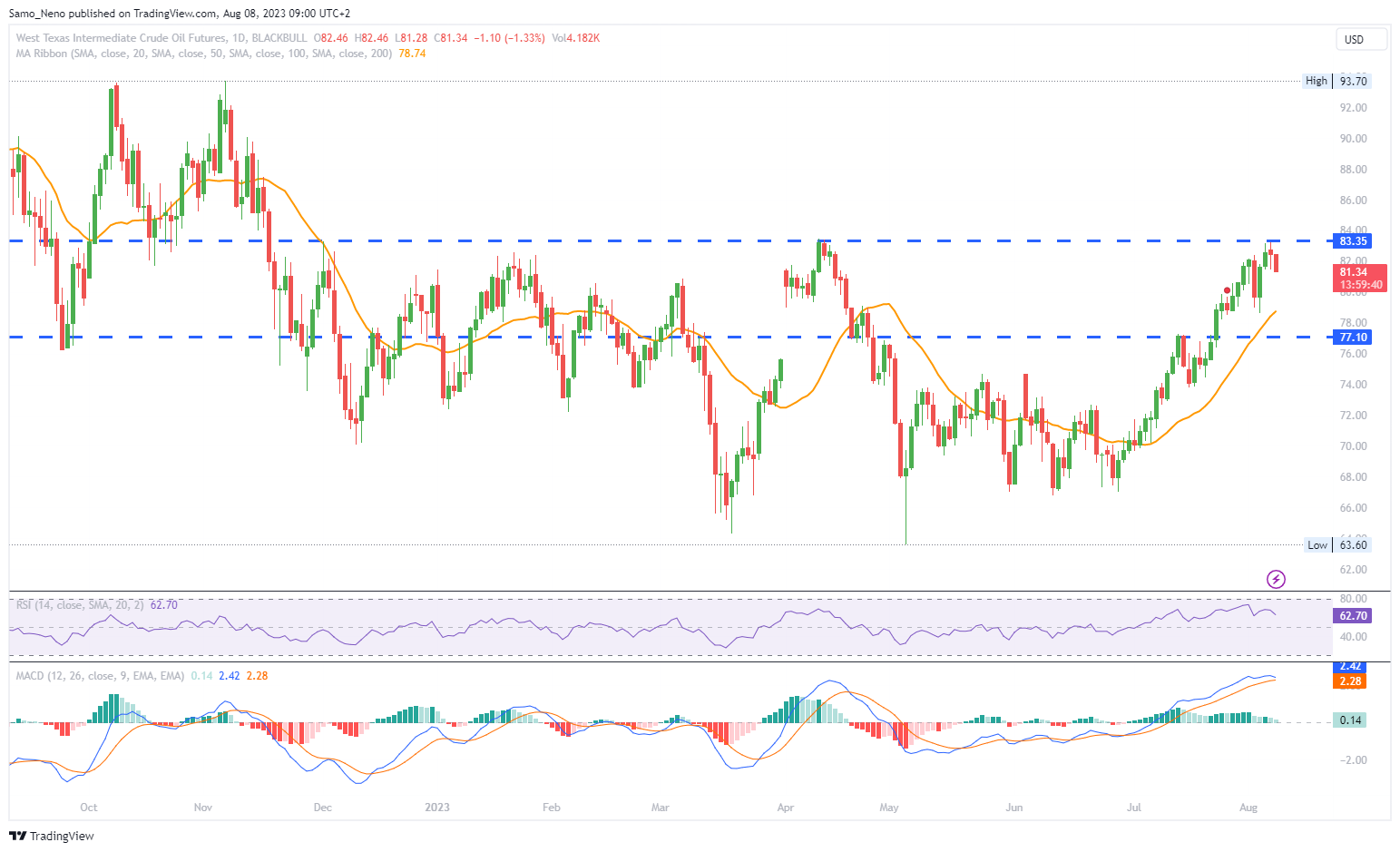EURUSD
- EUR/USD initiated the week on a weaker note, driven by disappointing economic indicators from Europe and the surge in U.S. Treasury yields. The euro faced headwinds as economic data failed to meet expectations, impacting the currency's performance.
- The market experienced limited volatility as many traders remained cautious, anticipating Thursday's U.S. inflation report. This data release is expected to have a substantial impact on the U.S. dollar's trajectory, influencing EUR/USD movement.
- EUR/USD is observed to be oscillating between significant technical levels subsequent to its recent retracement. The currency pair is encountering resistance around the ~1.1000 mark while finding support near ~1.0925.
- Despite the efforts, EUR/USD has encountered difficulty in surpassing a descending trend line in recent sessions, suggesting a strong resistance point that the currency has struggled to breach.
- The U.S. Dollar Index (DXY) indicated a modest rise at the start of the day, showing a 0.08% increase at 102.02. This uptick could play a role in shaping the EUR/USD pair's trajectory.
Closing statement: EUR/USD commenced the week with a downward trend, influenced by disappointing European economic data and increased U.S. Treasury yields. Traders exercised caution while awaiting the pivotal U.S. inflation report on Thursday, which is anticipated to guide the U.S. dollar's path and subsequently impact EUR/USD movements. Technical levels are being closely monitored, and the U.S. Dollar Index's movements add to the currency pair's dynamics.
GBPUSD
- GBP/USD commenced the week maintaining a lower position around 1.2750 during the European morning. The currency pair's movement indicates a cautious stance, potentially influenced by the events of the past week.
- In the previous week, GBP/USD experienced a drop to its lowest level since late June, nearing the 1.2600 mark. However, the pair managed to recover, reclaiming the 1.2700 range later in the week.
- The Bank of England's policy statement last week had a notable impact on GBP/USD. The central bank's decision to lower inflation forecasts exerted downward pressure on the pound, influencing its recent performance.
- BoE Governor Andrew Bailey's remarks during the post-meeting press conference added to the pressure on GBP/USD. He emphasized the absence of a predetermined path for interest rates from the current position, further affecting the currency pair's sentiment.
- Given the cautious tone projected by the Bank of England regarding potential policy tightening, GBP/USD may continue its downward trajectory for the week, potentially extending its weekly decline.
| SMA (20) | Slightly Falling |
|
|
| RSI (14) | Slightly Falling |
|
|
| MACD (12, 26, 9) | Slightly Falling |
|
Closing statement: GBP/USD's position near 1.2750 during the European morning suggests a cautious approach at the start of the week. The pair managed to recover from its recent lows, but the impact of the Bank of England's policy statement, along with Governor Bailey's statements, weighed on its performance. The currency pair's path in the coming days could be influenced by the BoE's cautious approach toward policy tightening, potentially leading to further declines.
GOLD
- Gold prices continued to decline on Tuesday, extending losses observed in the previous session. The ongoing decline could be attributed to uncertainty regarding the Federal Reserve's upcoming decisions and the anticipation of higher inflation figures, which contributed to the strengthening of the US dollar and Treasury yields.
- FOMC Member Harker is scheduled to deliver a speech about the economic outlook, hosted by the Philadelphia Business Journal. This event holds significance as it could offer insights into the Fed's perspective and potential policy directions.
- Federal Reserve Bank of New York President John Williams emphasized the need to maintain a restrictive policy stance for an extended period. Williams indicated openness to further interest rate hikes if deemed necessary based on economic conditions.
- Federal Reserve Governor Michelle Bowman expressed expectations of additional rate increases to combat inflation. Her statement reflects the central bank's commitment to addressing inflationary pressures to align with the goals of the Federal Open Market Committee (FOMC).
- Despite these statements, investor confidence in the likelihood of another rate hike this year by the Federal Reserve remains uncertain, indicating a level of skepticism regarding the central bank's future policy moves.
| SMA (20) | Slightly Rising |
|
|
| RSI (14) | Slightly Falling |
|
|
| MACD (12, 26, 9) | Falling |
|
|
Closing statement: Gold prices extended their decline on Tuesday, influenced by factors including uncertainty surrounding the Federal Reserve's decisions and anticipation of robust inflation data. The ongoing strength of the US dollar and Treasury yields contributed to the downward pressure on gold. Market participants closely monitored statements from key Fed officials, with comments highlighting the central bank's cautious stance on policy and concerns about inflation. As the week progresses, these factors are likely to play a crucial role in shaping gold's performance.
CRUDE OIL
- Crude oil prices remained relatively unchanged on Tuesday, displaying a balance between conflicting factors. Concerns over China's significant drop in oil imports for July were offset by supply-side worries arising from Saudi Arabia and Russia's production cuts.
- China, a major global oil importer and consumer, reported a substantial monthly decline in imports for July. The data revealed that oil imports were 18.8% lower compared to June, reflecting 10.29 million barrels per day. However, this figure was 17% higher than the corresponding period last year.
- China's reduced oil imports coincided with disappointing economic statistics for July, as the export-oriented economy experienced a 14.5% decrease in outbound shipments. This decline, the sharpest since February 2020, surpassed analysts' projections and contributed to overall demand concerns.
- Market participants were also eagerly awaiting data on U.S. oil and fuel product inventories. A Reuters poll indicated expectations of a 200,000-barrel reduction in crude inventories, along with a forecasted increase of 200,000 barrels in gasoline stocks.
- The cautious market sentiment reflects the interplay between demand worries associated with China's import drop and supply-side factors linked to production cuts by major oil producers. These dynamics will likely continue influencing crude oil prices in the coming days.
| SMA (20) | Rising |
|
|
|
| RSI (14) | Falling |
|
| |
| MACD (12, 26, 9) | Slightly Falling |
|
Closing statement: Crude oil prices held steady on Tuesday, as divergent factors shaped market sentiment. China's substantial decline in oil imports for July contributed to demand concerns amid disappointing economic data. However, the impact was counterbalanced by supply-side worries stemming from the output cuts by major producers. As anticipation builds for upcoming U.S. inventory data, the delicate balance between demand and supply dynamics is likely to remain a pivotal influence on crude oil prices.
DAX
- European stock markets are anticipated to open on a downward trajectory on Tuesday, driven by a combination of factors such as the latest German inflation figures and disappointing trade data from China.
- The DAX futures contract in Germany indicated a decline of 0.53% at the open, while CAC 40 futures in France showed a minor drop of 0.06%, and the FTSE 100 futures contract in the U.K. reflected a decrease of 0.56%.
- The start of the week brought attention to Germany's key inflation data, revealing that consumer prices in the largest European economy rose by 0.3% in July, aligning with the figures from June.
- The year-on-year inflation figure in Germany declined from 6.4% to 6.2% in July, signaling a decrease in price levels within the eurozone's most significant economy.
- This dip in inflation might influence the European Central Bank's decision-making process, potentially prompting a pause in its ongoing tightening cycle at the upcoming policy meeting in September.
| SMA (20) | Slightly Rising |
| |
| RSI (14) | Slightly Falling |
| |
| MACD (12, 26, 9) | Falling |
|
|
Closing statement: The European stock markets are poised for a decline at the opening bell, attributed to factors like German inflation data and disappointing Chinese trade figures. As Germany's inflation remains relatively stable but with a slight decrease, the focus shifts to its potential implications for the European Central Bank's policy direction. The market sentiment is expected to be shaped by these developments in the upcoming trading sessions.




